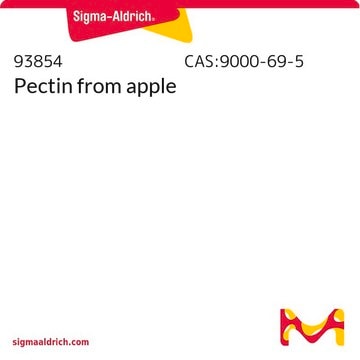73960
D-Galacturonic acid sodium salt
≥95.0% (T)
Synonym(s):
Sodium D-galacturonate
Sign Into View Organizational & Contract Pricing
All Photos(1)
About This Item
Empirical Formula (Hill Notation):
C6H9NaO7
CAS Number:
Molecular Weight:
216.12
MDL number:
UNSPSC Code:
12352201
PubChem Substance ID:
NACRES:
NA.22
Recommended Products
biological source
plant
Quality Level
Assay
≥95.0% (T)
form
powder or crystals
optical activity
[α]/D +36.5±2°, 5 hr, c = 10% in H2O
SMILES string
[Na+].OC1O[C@@H]([C@H](O)[C@H](O)[C@H]1O)C([O-])=O
InChI
1S/C6H10O7.Na/c7-1-2(8)4(5(10)11)13-6(12)3(1)9;/h1-4,6-9,12H,(H,10,11);/q;+1/p-1/t1-,2+,3+,4-,6?;/m0./s1
InChI key
MSXHSNHNTORCAW-KSSASCOMSA-M
Looking for similar products? Visit Product Comparison Guide
Storage Class Code
11 - Combustible Solids
WGK
WGK 3
Flash Point(F)
Not applicable
Flash Point(C)
Not applicable
Personal Protective Equipment
dust mask type N95 (US), Eyeshields, Gloves
Choose from one of the most recent versions:
Already Own This Product?
Find documentation for the products that you have recently purchased in the Document Library.
Customers Also Viewed
S Rasul et al.
Plant, cell & environment, 35(8), 1483-1499 (2012-03-08)
Nitric oxide (NO) regulates a wide range of plant processes from development to environmental adaptation. In this study, we investigated the production and/or function of NO in Arabidopsis thaliana leaf discs and plants elicited by oligogalacturonides (OGs) and challenged with
Chatchaya Onumpai et al.
Applied and environmental microbiology, 77(16), 5747-5754 (2011-07-05)
To evaluate the fermentation properties of oligosaccharides derived from pectins and their parent polysaccharides, a 5-ml-working-volume, pH- and temperature-controlled fermentor was tested. Six pectic oligosaccharides representing specific substructures found within pectins were prepared. These consisted of oligogalacturonides (average degrees of
Nina Elisabeth Nagy et al.
Planta, 236(4), 1125-1133 (2012-05-31)
Heterobasidion parviporum, a common pathogenic white-rot fungus in managed Norway spruce forests in northern and central Europe, causes extensive decay columns within stem heartwood of the host tree. Infected trees combat the lateral spread of decay by bordering the heartwood
Joosu Kuivanen et al.
Applied and environmental microbiology, 78(24), 8676-8683 (2012-10-09)
D-Galacturonic acid, the main monomer of pectin, is an attractive substrate for bioconversions, since pectin-rich biomass is abundantly available and pectin is easily hydrolyzed. l-Galactonic acid is an intermediate in the eukaryotic pathway for d-galacturonic acid catabolism, but extracellular accumulation
Eline H Huisjes et al.
Applied and environmental microbiology, 78(15), 5052-5059 (2012-05-15)
The efficient fermentation of mixed substrates is essential for the microbial conversion of second-generation feedstocks, including pectin-rich waste streams such as citrus peel and sugar beet pulp. Galacturonic acid is a major constituent of hydrolysates of these pectin-rich materials. The
Our team of scientists has experience in all areas of research including Life Science, Material Science, Chemical Synthesis, Chromatography, Analytical and many others.
Contact Technical Service







